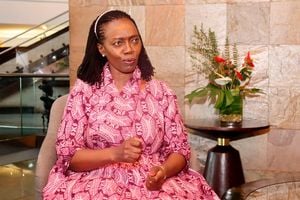Russia unveils cancer vaccine amid skepticism from researchers

Russian President Vladimir Putin.
What you need to know:
- In its report, Andrey Kaprin, General Director of the Radiology Medical Research Centre of the Russian Ministry of Health said that the drug will be distributed to patients free of charge, with the Russian government meeting the dosage cost. The vaccine is expected to be available globally by early 2025.
- Dr Shem Otoi, a Kenyan researcher not involved in the vaccine development or announcement, stated that a free cancer vaccine would be a game changer.
The Russian government has announced the development of a personalised cancer vaccine, designed to treat existing cancers rather than prevent tumor formation.
However, researchers have raised concerns about the vaccine’s effectiveness and potential implications.
The announcement was first made public through the state-owned news agency TASS, which also operates Radio Rossiya.
In its report, Andrey Kaprin, General Director of the Radiology Medical Research Centre of the Russian Ministry of Health said that the drug will be distributed to patients free of charge, with the Russian government meeting the dosage cost. The vaccine is expected to be available globally by early 2025.
Dr Shem Otoi, a Kenyan researcher not involved in the vaccine development or announcement, stated that a free cancer vaccine would be a game changer.
“You see, today, most people succumb to cancer and the burden is too high. Two, the availability of drugs. Third, there is no public health insurance that supports such terminal illnesses. But even if there were, you’d find that you can use your insurance card, but then they don't have the drugs that you need. So, availability here is key,” he said.
The breakthrough in cancer treatment could bring hope to millions of patients, particularly in Kenya, where cancer ranks among the top three leading causes of death.
The Pharmacy and Poisons Board (PPB), which is responsible for registering vaccines and ensuring their safety, quality, and efficacy, has stated that the vaccine is still in the trial phase and has not yet been submitted to National Regulatory Authorities for Market Authorization.
"Once the vaccine is approved by any regulatory authority, the PPB is highly likely to use reliance to evaluate it," said Dr. Fred Siyoi, chief executive officer of the PPB.
However, skepticism has quickly emerged following the announcement. Here’s what we know so far.
Unlike vaccines taken to prevent acquiring a particular disease, the vaccine is designed to treat the disease rather than prevent the formation of tumours. As such, it will be used by cancer patients. The Russian government claims that each shot will be personalised for the individual patient.
According to Alexander Gintsburg, director of the Gamaleya National Research Centre for Epidemiology and Microbiology in an interview with TASS, the state has done pre-clinical trials in collaboration with various research centres and results show that it suppresses tumor development and potential metastases. However, advancements in artificial intelligence (AI) are streamlining the process.
Earlier this year, Russian President Vladimir Putin said in televised comments the country had “come very close to the creation of so-called cancer vaccines and immunomodulatory drugs of a new generation.”
This type of vaccine is called an mRNA vaccine. It teaches your body how to fight diseases by providing specific instructions.
Think of it as sending your body a "blueprint" for making a harmless piece of a germ, like a virus or cancer cell. The process trains the immune system to recognise and create antibodies against the protein. When the same antigens are detected on tumour cells, the immune system launches an attack on the cancer cells.
Unlike Covid-19 mRNA vaccines that target a single specific protein, the spike protein, the virus causing COVID-19 has a relatively stable structure. Cancer, in contrast, is more complex and targets multiple tumor antigens.
Some scientists are skeptical about Russia’s announcement of the cancer vaccine due to the absence of critical details and a lack of scientific transparency. Researchers point out that the announcement does not specify which types of cancer the vaccine intends to treat.
Furthermore, no clinical trial data has been published to demonstrate its safety, efficacy, or potential side effects, leaving the scientific community without the evidence needed to evaluate its validity.
The absence of a vaccine name and detailed information about its development process further deepens doubts.
This scepticism is heightened by a history of similar claims, such as Russia's early announcements regarding the Sputnik V COVID-19 vaccine, which was criticized for deviating from standard scientific protocols before its release.
Cancer, being vastly more complex than infectious diseases, requires rigorous testing and validation. Without comprehensive data from clinical trials and clear communication about its mechanism and scope, the claims surrounding this vaccine remain speculative, discouraging caution within the medical and scientific communities.
Data from the World Health Organization (WHO) shows that there are currently six licensed vaccines against human papillomaviruses (HPV) that cause many cancers, including cervical cancer.
Moderna is currently working on mRNA vaccines. There are also ongoing clinical trials for personalised cancer vaccines in the UK and the USA. For instance, in the USA, researchers have developed a personalised vaccine for the treatment of glioblastoma, a brain cancer.




